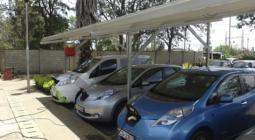Green mobility: an imperative for Africa

At the heart of West Africa's socio-economic evolution, green mobility emerges not only as a crucial concern, but as an urgent necessity. Faced with the alarming impact of current transportation systems on our environment, our public health, and our economy, how can we turn a blind eye?
Visualize Africa: its rich history, its diverse cultures, its varied landscapes… Unfortunately, this image is, year after year, veiled by a haze of atmospheric pollution. This pollution is responsible for thousands of premature deaths each year, endangering the lives of our citizens and devouring our financial resources.
On this booming continent, where urbanization is intensifying, sustainable mobility is more central than ever. Congestion, toxic emissions and dependence on fossil fuels are taking a heavy toll on our expanding metropolises. But in the face of these challenges, an opportunity presents itself to us: electric vehicles (EVs).
Certainly, the current infrastructure is a barrier. Charging stations are insufficient, and the transition to more expensive vehicles can seem daunting. But these challenges are not insurmountable. Nations like Norway and China have demonstrated that EVs can dominate the market with the right incentives and infrastructure.
Visionary companies illustrate this dynamic throughout Africa, from East to West, from North to South. Pioneers in the rental of electric vehicles in the region, they mark the start of a transport revolution. A revolution that aims for a future where mobility is synonymous with ecological progress.
And this transition is not only beneficial for the environment.
The green mobility industry is a potential catalyst for job creation, technological innovation, and a more robust economy. EVs cost less to maintain, providing long-term savings for users.
However, to realize this vision, multi-sector collaboration is essential.
Governments, businesses and citizens must join forces. Tax incentives, awareness campaigns and the development of suitable infrastructure are all key elements to promote this transition.
The numbers speak for themselves.
A study in the scientific journal The Lancet Planetary Health , which looked at the situation in four fast-growing cities (Accra, Cairo, Johannesburg and Lagos) concluded that toxic air – particularly particles and industrial gases and transport, but also wood stoves – caused the premature death of 1.1 million people in 2019. For comparison, 650,000 people lost their lives due to illnesses linked to HIV-AIDS in the world the same year, according to UN figures.
Instead, taking a green approach would save 125,000 lives, save $20 billion in costs and reduce emissions in these cities by around 20% by 2040.
At the same time, the green mobility industry could create millions of jobs. However, if we do not change, the cost of our inaction could be multiplied by six, again according to The Lancet Planetary Health .
The urgency is therefore clear, but optimism remains.
By combining our resources, expertise and collective will, we can make Africa a leader in green mobility.
As COP28 approaches, we have an opportunity. That of building a future where each trip is a step towards a more sustainable world.
Let's seize it... Before it escapes u





